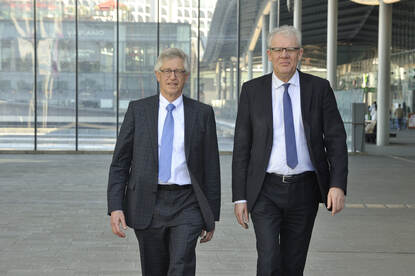Organisation, quality management and finances
Human Resource Management
In 2018 the MEB had an average of 386 employees (351 FTEs). Levels of absenteeism due to illness were 1.7% for long-term absenteeism (ill for longer than 42 days) and 1.6% for short-term absenteeism.
MEB employees: percentage of men and women
Quality management and complaints
Quality management
The MEB has been ISO certified since 2006 and according to the new ISO 9001:2015 standard since 2017. The ISO auditors evaluated MEB's quality management systems in relation to the new standard, and expressed their confidence in the proper functioning of the MEB's systems. The new standard means an increased focus on the environment in which the organisation operates, risks and opportunities, stakeholder management and managing improvements.
Complaints
21 complaints were received in 2018. Of these 16 were well-founded, 2 were unfounded and 3 were non-admissible. A well-founded complaint means that the MEB has failed to give a reaction about the status or submission of a case within the response period of three weeks. The number of complaints has increased compared to 2017. The MEB received 14 complaints in 2017 and 12 of these were well founded.
Finances
Financial control
The difference between expectations before the start of the year and what actually happened was huge. In recent years the MEB has grown considerably, both in terms of the quantity of work and in terms of turnover and the number of staff. During the course of 2017 the growth in turnover flattened, but the costs continued to increase strongly. As a result there was a risk, during the course of the year, of a deficit of € 8 million for the whole of 2018. This deficit was significantly reduced by ceasing activities, not renewing temporary contracts and not retaining temporary workers. In addition, extra contributions were received from the ministry, as a result of which € 1.4 million of the equity capital was used.
Result
The MEB Agency eventually posted a negative result of € 4.0 million in 2018. During the audit of the 2018 financial year the ADR adopted the position that contributions by the ministry on behalf of operations could not be included in the revenues. These are regarded as making up the balance of the equity capital and should therefore be accounted for as a direct balance sheet movement. Consequently the turnover was reduced by € 2.6 million and with that the result also ended up being € 2.6 lower. The comparative figures for 2017 were also amended due to this changed position. For 2017 the turnover of the parent ministry was reduced by an amount of € 1.8 million and, with that, the result as well. The amount of € 1.8 million was accounted for as a change in equity.
In 2018 the turnover of the parent ministry was substantially higher than budgeted, partly due to a contribution to prepare for Brexit and the ICP project. The costs were also higher than budgeted. The increase in costs was caused primarily by the costs of staff within the framework of Brexit and the costs of ICT developments.
Brexit
Following the decision by the United Kingdom to leave the European Union, the MEB Agency expects that a lot of extra centralised work will have to be carried out in the near future. As a contribution to the run-up costs for expanding production capacity, the parent ministry allocated an amount of € 1 million to the MEB agency in 2018.
International Collaboration Program (ICP)
Following on from Brexit and its implications for the entire European Assessment Network, the question of how to share the workload more evenly over the network has been examined. The assessment capacity in countries with currently little assessment capacity is an important measure. In 2018 the ICP project was started and, using financing from VWS, the MEB supported other countries in the European network financially in terms of both building capacity and training staff. € 1.3 million was spent on this project in 2018.
More financial details and a further clarification can be found in the annual accounts.
About the MEB
You can find more information about the MEB on the MEB website.



